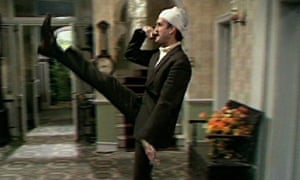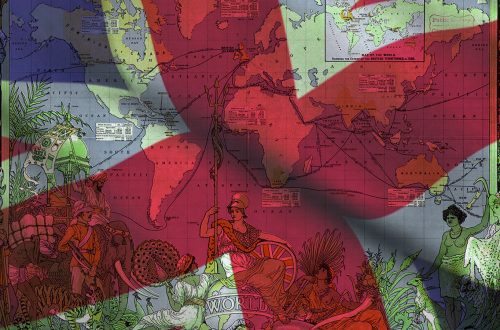Peter Beinart, editor of The New Republic, has written a manifesto for anti-totalitarian American liberals. It deserves the widest possible circulation among that group, though I’m sure our like-minded comrades in other countries will find much that resonates for them too.
It is time, Beinart argues, for those on the Left to choose sides and fight it out– as they did almost 60 years ago.
I don’t agree with every word but I strongly recommend reading the whole thing (especially if you intend to post a comment about it). If you don’t have time, here are some excerpts:
On January 4, 1947, 130 men and women met at Washington’s Willard Hotel to save American liberalism…
During World War II, only one major liberal organization, the Union for Democratic Action (UDA), had banned communists from its ranks. At the Willard, members of the UDA met to expand and rename their organization. The attendees, who included Reinhold Niebuhr, Arthur Schlesinger Jr., John Kenneth Galbraith, Walter Reuther, and Eleanor Roosevelt, issued a press release that enumerated the new organization’s principles. Announcing the formation of Americans for Democratic Action (ADA), the statement declared, “[B]ecause the interests of the United States are the interests of free men everywhere,” America should support “democratic and freedom-loving peoples the world over.” That meant unceasing opposition to communism, an ideology “hostile to the principles of freedom and democracy on which the Republic has grown great.”
At the time, the ADA’s was still a minority view among American liberals. Two of the most influential journals of liberal opinion, The New Republic and The Nation, both rejected militant anti-communism. Former Vice President Henry Wallace, a hero to many liberals, saw communists as allies in the fight for domestic and international progress…
But, over the next two years, in bitter political combat across the institutions of American liberalism, anti-communism gained strength. With the ADA’s help, Truman crushed Wallace’s third-party challenge en route to reelection. The formerly leftist Congress of Industrial Organizations (CIO) expelled its communist affiliates and The New Republic broke with Wallace, its former editor. The American Civil Liberties Union (ACLU) denounced communism, as did the NAACP. By 1949, three years after Winston Churchill warned that an “iron curtain” had descended across Europe, Schlesinger could write in The Vital Center: “Mid-twentieth century liberalism, I believe, has thus been fundamentally reshaped … by the exposure of the Soviet Union, and by the deepening of our knowledge of man. The consequence of this historical re-education has been an unconditional rejection of totalitarianism.”
…..
Kerry was a flawed candidate, but he was not the fundamental problem. The fundamental problem was the party’s liberal base, which would have refused to nominate anyone who proposed redefining the Democratic Party in the way the ADA did in 1947…
In 1950, the journal The New Leader divided American liberals into “hards” and “softs.” The hards, epitomized by the ADA, believed anti-communism was the fundamental litmus test for a decent left. Non-communism was not enough; opposition to the totalitarian threat was the prerequisite for membership in American liberalism because communism was the defining moral challenge of the age.
The softs, by contrast, were not necessarily communists themselves. But they refused to make anti-communism their guiding principle. For them, the threat to liberal values came entirely from the right–from militarists, from red-baiters, and from the forces of economic reaction. To attack the communists, reliable allies in the fight for civil rights and economic justice, was a distraction from the struggle for progress.
[Michael] Moore is a non-totalitarian, but, like Wallace, he is not an anti-totalitarian. And, when Democratic National Committee Chairman Terry McAuliffe and Tom Daschle flocked to the Washington premiere of Fahrenheit 9/11, and when Moore sat in Jimmy Carter’s box at the Democratic convention, many Americans wondered whether the Democratic Party was anti-totalitarian either.
If Moore is America’s leading individual soft, liberalism’s premier soft organization is MoveOn. MoveOn was formed to oppose Clinton’s impeachment, but, after September 11, it turned to opposing the war in Afghanistan. A MoveOn-sponsored petition warned, “If we retaliate by bombing Kabul and kill people oppressed by the Taliban, we become like the terrorists we oppose.”
…..
Like the softs of the early cold war, MoveOn sees threats to liberalism only on the right. And thus, it makes common cause with the most deeply illiberal elements on the international left. In its campaign against the Iraq war, MoveOn urged its supporters to participate in protests co-sponsored by International ANSWER, a front for the World Workers Party, which has defended Saddam, Slobodan Milosevic, and Kim Jong Il. When George Packer, in The New York Times Magazine, asked [MoveOn spokesman Eli] Pariser about sharing the stage with apologists for dictators, he replied, “I’m personally against defending Slobodan Milosevic and calling North Korea a socialist heaven, but it’s just not relevant right now.”
…For all the Bush administration’s talk about promoting freedom in the Muslim world, its efforts have been crippled by the Republican Party’s deep-seated opposition to foreign aid and nation-building, illustrated most disastrously in Iraq. The resources that the United States has committed to democratization and development in the Middle East are trivial, prompting Naiem Sherbiny of Egypt’s reformist Ibn Khaldun Center to tell The Washington Post late last year that the Bush administration was “pussyfooting at the margin with small stuff.”
…[W]hile an updated Marshall Plan and an expanded Peace Corps for the Muslim world are more naturally liberal than conservative ideas, they have not resonated among post-September 11 liberal activists. A new Peace Corps requires faith in America’s ability to improve the world, something that Moore–who has said the United States “is known for bringing sadness and misery to places around the globe”–clearly lacks…
What the ADA understood, and today’s softs do not, is that, while in a narrow sense the struggle against totalitarianism may divert resources from domestic causes, it also provides a powerful rationale for a more just society at home. During the early cold war, liberals repeatedly argued that the denial of African American civil rights undermined America’s anti-communist efforts in the Third World…
For liberals to make such arguments effectively, they must first take back their movement from the softs. We will know such an effort has begun when dissension breaks out within America’s key liberal institutions…
…[D]espite [the] differences, Islamist totalitarianism–like Soviet totalitarianism before it–threatens the United States and the aspirations of millions across the world. And, as long as that threat remains, defeating it must be liberalism’s north star. Methods for defeating totalitarian Islam are a legitimate topic of internal liberal debate. But the centrality of the effort is not. The recognition that liberals face an external enemy more grave, and more illiberal, than George W. Bush should be the litmus test of a decent left.
…..
Of all the things contemporary liberals can learn from their forbearers half a century ago, perhaps the most important is that national security can be a calling. If the struggles for gay marriage and universal health care lay rightful claim to liberal idealism, so does the struggle to protect the United States by spreading freedom in the Muslim world. It, too, can provide the moral purpose for which a new generation of liberals yearn…


